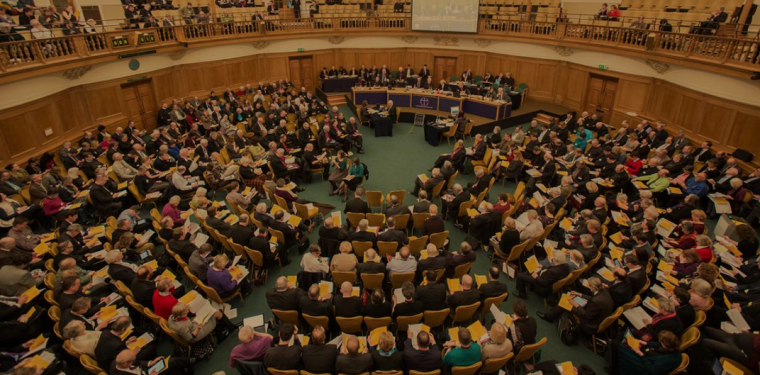Where the Church's unity comes from

Is there a difference in the way we should seek peace in places torn by civil war and churches torn by doctrinal disputes?
The Archbishop of Canterbury, the Most Rev Justin Welby, arrived at General Synod direct from a Pilgrimage of Peace with the Pope and the Moderator of the Church of Scotland to South Sudan, where the 'other Justin', the Most Rev Dr Justin Badi Arama is the senior Archbishop.
Over the past year, these two men have come to represent the deep disagreements within the Anglican Communion.
Archbishop Welby, a veteran when it comes to peace talks, was not afraid to challenge the civil leaders of South Sudan as they gathered in the Presidential Palace in Juba.
Archbishop Welby said, "When I remember the commitments that were made by you in 2019, I am grieved, I am sad that we still hear of such tragedy. We hoped and prayed for more. We expected more. You promised more."
He continued, "We cannot pick and choose parts of a peace agreement. Every part must be done by every person. And that costs much."
Archbishop Badi agreed. He welcomed the Pilgrimage of Peace to his country, saying, "We pray their visit will remind us as South Sudanese people to repent of our own spirit of violence and mistrust, and to recommit ourselves to true reconciliation, justice and peaceful co-existence."
A country needs good order.
This does no more than reflect the words of the Book of Common Prayer (BCP), the liturgical benchmark for the Church of England, in its prayers for the King and all who govern under him – including prayers for justice and the punishment of "wickedness and vice."
In his presidential speech at General Synod on Monday, Archbishop Welby spoke of the Pilgrimage of Peace as "three people sent in the love of Christ to challenge a darkness in South Sudan that has, in the last nine years, cost half a million lives".
All very good, but he then went on to speak of the growing relationship between the Anglican, Presbyterian and Roman Catholic Churches, suggesting, "Unity comes first not from doctrinal unanimity but by mutual love released by the Holy Spirit."
And in that there is a category error - it is wrong to presume that peace-making in the Church follows the same pattern as peace-making in society.
Peace and concord in the Church comes from a different source, as again the BCP makes clear: "... grant, that all they that do confess thy holy Name may agree in the truth of thy holy Word, and live in unity, and godly love."
It is only as God's people submit to the teaching of God's word that there can be unity.
Archbishop Welby may long for a Church that walks together in visible unity, even if there is doctrinal diversity. He may actively rejoice in the diversity of views held by people in the Church of England. But the BCP teaches us that a Church that seeks unity by disagreeing well about the truth of God's Holy Word is surely destined for ongoing discord.
In a statement issued last month, Archbishop Badi lamented just this: "the [English] bishops' collective failure to keep their ordination/consecration vows to defend biblical truth by their life and doctrine..."
And he said that Archbishop Welby himself was "advocating false teaching". He has made clear that the Archbishop's peace mission does nothing to change that.
For now, we will wait and see if the laity and clergy at General Synod are prepared to follow Archbishop Welby down the path which in the words of Archbishop Badi, will "...alienate the Mother Church from large swathes of the Communion".
As the South Sudanese Archbishop warned, "It will inevitably lead to a re-configuration, and a re-structuring of the Communion as we currently know it."











